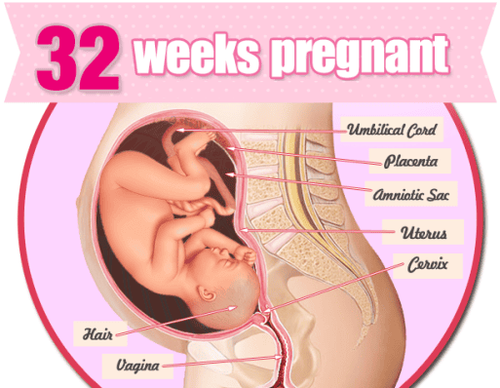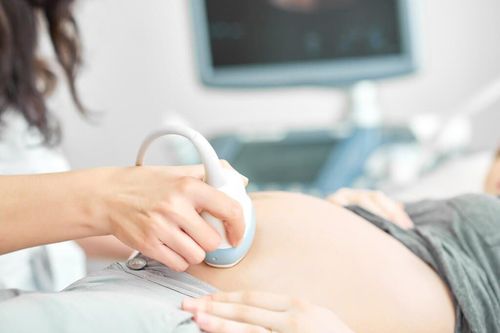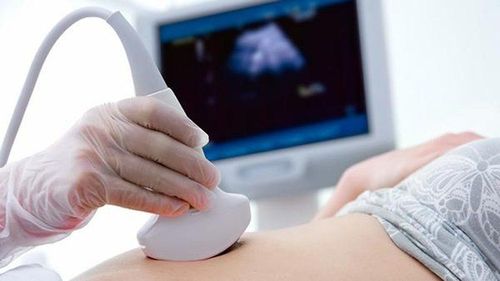This is an automatically translated article.
Antenatal screening is the use of specific screening measures during pregnancy to confirm the diagnosis of diseases caused by genetic disorders in the fetus such as: Down syndrome (triploid 13). ), Edwards syndrome (triploid 18) and neural tube defects... So at what week are prenatal screenings performed?1. Common fetal malformations
1.1 Cleft lip and cleft palate Cleft palate is a common disease in Vietnam as well as Asian countries that folk people call cleft lip - cleft palate. This is a disease with a high incidence: about 500-600 babies are born with one infection. The disease is caused by many factors such as genetics and environment. Mother taking drugs, exposure to chemicals, infections during pregnancy...
1.2 Congenital heart defects Congenital heart defects are formed during the fetal period and usually exist from the time the baby is born. During the fetal period, the process of formation and development of the heart and large blood vessels does not take place normally, causing malformations. It is estimated that nearly 1% of babies born alive may have heart defects.
1.3. Down syndrome Down syndrome is a chromosomal disorder that usually occurs during pregnancy. The main cause is an extra chromosome number 21 in the fetus. This syndrome is the most common among the diseases caused by the disorder. NST disorder. One out of every 800-1,000 newborns is born with Down syndrome. About 50% of children with Down syndrome have poor visual and auditory development.
1.4. Foot deformity is one of the most common birth defects. The foot malformations are often caused by the position in the uterus, during pregnancy, the feet are compressed in the uterus due to many factors such as large pregnancy, narrow pelvis of the mother, twins,... Besides In addition, studies in the world also show that this malformation can be caused by family factors, the posture of the pregnant woman during pregnancy while sitting, working or doing daily activities, etc. The children have malformations. The feet are sometimes accompanied by other malformations such as hip dysplasia, knee flexion, neck curvature, clubfoot, congenital polyarticular stiffness...
Prenatal screening and diagnosis can detect and intervene Early intervention for signs of illness can help a child develop normally or this intervention can help mitigate the consequences for the child. In addition, early detection of fetal malformations also helps parents make decisions to keep or abort the fetus if the fetus has severe defects that are difficult to survive or develop after birth.

Dị tật bàn chân ở trẻ
2. At what week is prenatal screening?
Prenatal screening has two basic activities: maternal blood test and fetal morphological ultrasound.
First trimester of pregnancy:
Doctors conduct ultrasound of fetal morphology, measure nuchal translucency to detect the risk of Down syndrome. This diagnosis helps the doctor detect other problems such as the fetus without a skull, ... A pregnant mother's blood test determines whether the mother has rubella, HIV and the risk of the fetus having genetic abnormalities If yes Abnormalities, the doctor continues to perform a biopsy of the placenta, accurately determining the gene status as well as other problems. Second trimester of pregnancy:
At this time, the fetus is bigger, the doctor can look at each part of the baby's body. Screening and diagnosis during this time can detect abnormalities in the baby's nervous system, such as spina bifida, hydrocephalus, etc.), abnormalities in the cardiovascular system (such as defects in the heart, blood vessels, etc.) , heart valve defects...), abnormalities in the digestive system (such as malformations in the intestines, stomach...), in the genital system, in bones (such as skeletal dysplasia, short limbs...) blood tests in pregnant women, look for new infections in the mother, new chromosomal abnormalities. If the test shows a problem, the doctor will do amniocentesis to determine the exact condition of the fetus.
3. Screening to diagnose fetal malformations at what week?
3.1 Week 12 to 14 This is the most appropriate time to conduct nuchal translucency measurement for the fetus. The method of measuring nuchal translucency is to predict some chromosomal abnormalities that can cause Down's disease, diaphragmatic hernia... Doctors have also been able to diagnose problems with skull defects, syndromes, etc. Down syndrome or other chromosomal problems during this time.
If this index is high, the doctor will assign pregnant women amniocentesis at 17-18 weeks of pregnancy to diagnose the disease. This ultrasound can also detect some other malformations such as anencephaly, cleft palate, no nasal bone...
In addition to ultrasound, during this time, pregnant women should do a double test to screening for congenital abnormalities of the fetus. This stage is the only time when an accurate diagnosis can be made because after 14 weeks, the diagnostic ultrasound is no longer accurate.
3.2 Weeks 21 to 24 Currently, ultrasound technology gives clear images at many different angles, so it's easier to detect early fetal abnormalities such as cleft lip, cleft palate, cleft lip and jaw. frogs, hydrocephalus, congenital heart, diaphragmatic hernia or abdominal wall cleft, vertebral cleft... and even with ultrasound technology, heart-related malformations can also be detected during this period. because this is the time when many birth defects in the fetus appear. Remember, ultrasound only detects visible abnormalities and is completely incapable of diagnosing dysfunction.
3.3 Week 30-32

Thai tuần thứ 30 - 32
Color ultrasound at 30-32 weeks will help doctors detect abnormalities in the arteries, heart and brain structure, or placental abnormalities such as the umbilical cord wrapped around the neck, abnormalities of attachment site of the umbilical cord.
On the other hand, color ultrasound at this time also helps doctors know whether the growth of the uterus is fast or slow. If the uterus grows slowly, it can cause fetal distress and asphyxia after delivery.
At this time, the fetus has grown, there is only one way to give birth to the baby, but understanding the problems of the fetus helps the mother to proactively choose a suitable birth place and set a better care plan for the baby. Early detection of malformations will help you to limit the dangers by choosing a birthplace, birth method and being well prepared for the care and upbringing of the baby when it is born.
In addition to the three times mentioned above, at week 15 and week 21, mothers also need to do biochemical tests to screen for possible chromosomal aberrations.
Above are general checkups about fetal health. The antenatal check-up at these times can help the mother predict the abnormal growth in the baby's uterus, which often causes fetal distress or asphyxia when the baby is born. In cases where the fetus is already large, knowing the problems of the fetus can help the mother actively choose a suitable birthplace and plan for care and treatment for the baby.
Currently, Vinmec International General Hospital applies prenatal and newborn screening methods. Among them are advanced prenatal screening methods such as non-invasive prenatal screening (NIPT). Compared with traditional methods, non-invasive prenatal screening (NIPT) gives more accurate results (especially for Down syndrome), and reduces the proportion of pregnant women who are indicated for amniocentesis. necessary. The outstanding advantage of this method is that it is non-invasive and can be carried out as early as the 9th week of pregnancy. In addition, 100% of babies born at Vinmec are screened for hearing and other newborn screenings.
Besides, at Vinmec International Hospital system, we also provide maternity services with outstanding quality to help pregnant women feel more secure in taking care of themselves and their baby's health since pregnancy. come after birth. The hospital gathers a team of leading experts, experienced and good at expertise. Fully equipped system, modern. The testing process meets international standards and continuously updates domestic and foreign treatment trends.
After birth, the baby will be cared for in a sterile room before being returned to the mother. Pregnant women will rest in a high-class hospital room, designed according to international hotel standards, 1 mother 1 room with full facilities and modern equipment. Mothers will be consulted by nutritionists on how to feed the baby before being discharged from the hospital. Postpartum follow-up with both mother and baby with leading Obstetricians and Paediatricians.
Please dial HOTLINE for more information or register for an appointment HERE. Download MyVinmec app to make appointments faster and to manage your bookings easily.













